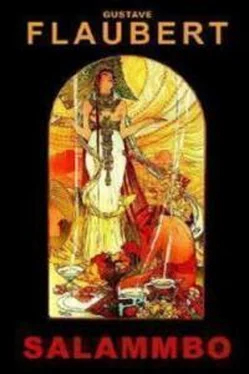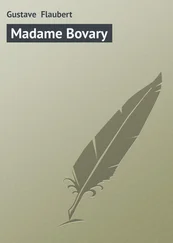He returned the same evening.
Hamilcar accepted the challenge. The encounter should take place the following day at sunrise, in the plain of Rhades.
The Mercenaries wished to know whether he had said anything more, and the Libyan added:
"As I remained in his presence, he asked me what I was waiting for. 'To be killed!' I replied. Then he rejoined: 'No! begone! that will be to–morrow with the rest.'"
This generosity astonished the Barbarians; some were terrified by it, and Matho regretted that the emissary had not been killed.
He had still remaining three thousand Africans, twelve hundred Greeks, fifteen hundred Campanians, two hundred Iberians, four hundred Etruscans, five hundred Samnites, forty Gauls, and a troop of Naffurs, nomad bandits met with in the date region—in all seven thousand two hundred and nineteen soldiers, but not one complete syntagmata. They had stopped up the holes in their cuirasses with the shoulder–blades of quadrupeds, and replaced their brass cothurni with worn sandals. Their garments were weighted with copper or steel plates; their coats of mail hung in tatters about them, and scars appeared like purple threads through the hair on their arms and faces.
The wraiths of their dead companions came back to their souls and increased their energy; they felt, in a confused way, that they were the ministers of a god diffused in the hearts of the oppressed, and were the pontiffs, so to speak, of universal vengeance! Then they were enraged with grief at what was extravagant injustice, and above all by the sight of Carthage on the horizon. They swore an oath to fight for one another until death.
The beasts of burden were killed, and as much as possible was eaten so as to gain strength; afterwards they slept. Some prayed, turning towards different constellations.
The Carthaginians arrived first in the plain. They rubbed the edges of their shields with oil to make the arrows glide off them easily; the foot–soldiers who wore long hair took the precaution of cutting it on the forehead; and Hamilcar ordered all bowls to be inverted from the fifth hour, knowing that it is disadvantageous to fight with the stomach too full. His army amounted to fourteen thousand men, or about double the number of the Barbarians. Nevertheless, he had never felt such anxiety; if he succumbed it would mean the annihilation of the Republic, and he would perish on the cross; if, on the contrary, he triumphed, he would reach Italy by way of the Pyrenees, the Gauls, and the Alps, and the empire of the Barcas would become eternal. Twenty times during the night he rose to inspect everything himself, down to the most trifling details. As to the Carthaginians, they were exasperated by their lengthened terror. Narr' Havas suspected the fidelity of his Numidians. Moreover, the Barbarians might vanquish them. A strange weakness had come upon him; every moment he drank large cups of water.
But a man whom he did not know opened his tent and laid on the ground a crown of rock–salt, adorned with hieratic designs formed with sulphur, and lozenges of mother–of–pearl; a marriage crown was sometimes sent to a betrothed husband; it was a proof of love, a sort of invitation.
Nevertheless Hamilcar's daughter had no tenderness for Narr' Havas.
The recollection of Matho disturbed her in an intolerable manner; it seemed to her that the death of this man would unburden her thoughts, just as people to cure themselves of the bite of a viper crush it upon the wound. The king of the Numidians was depending upon her; he awaited the wedding with impatience, and, as it was to follow the victory, Salammbo made him this present to stimulate his courage. Then his distress vanished, and he thought only of the happiness of possessing so beautiful a woman.
The same vision had assailed Matho; but he cast it from him immediately, and his love, that he thus thrust back, was poured out upon his companions in arms. He cherished them like portions of his own person, of his hatred,—and he felt his spirit higher, and his arms stronger; everything that he was to accomplish appeared clearly before him. If sighs sometimes escaped him, it was because he was thinking of Spendius.
He drew up the Barbarians in six equal ranks. He posted the Etruscans in the centre, all being fastened to a bronze chain; the archers were behind, and on the wings he distributed the Naffurs, who were mounted on short–haired camels, covered with ostrich feathers.
The Suffet arranged the Carthaginians in similar order. He placed the Clinabarians outside the infantry next to the velites, and the Numidians beyond; when day appeared, both sides were thus in line face to face. All gazed at each other from a distance, with round fierce eyes. There was at first some hesitation; at last both armies moved.
The Barbarians advanced slowly so as not to become out of breath, beating the ground with their feet; the centre of the Punic army formed a convex curve. Then came the burst of a terrible shock, like the crash of two fleets in collision. The first rank of the Barbarians had quickly opened up, and the marksmen, hidden behind the others, discharged their bullets, arrows, and javelins. The curve of the Carthaginians, however, flattened by degrees, became quite straight, and then bent inwards; upon this, the two sections of the velites drew together in parallel lines, like the legs of a compass that is being closed. The Barbarians, who were attacking the phalanx with fury, entered the gap; they were being lost; Matho checked them,—and while the Carthaginian wings continued to advance, he drew out the three inner ranks of his line; they soon covered his flanks, and his army appeared in triple array.
But the Barbarians placed at the extremities were the weakest, especially those on the left, who had exhausted their quivers, and the troop of velites, which had at last come up against them, was cutting them up greatly.
Matho made them fall back. His right comprised Campanians, who were armed with axes; he hurled them against the Carthaginian left; the centre attacked the enemy, and those at the other extremity, who were out of peril, kept the velites at a distance.
Then Hamilcar divided his horsemen into squadrons, placed hoplites between them, and sent them against the Mercenaries.
Those cone–shaped masses presented a front of horses, and their broader sides were filled and bristling with lances. The Barbarians found it impossible to resist; the Greek foot–soldiers alone had brazen armour, all the rest had cutlasses on the end of poles, scythes taken from the farms, or swords manufactured out of the fellies of wheels; the soft blades were twisted by a blow, and while they were engaged in straightening them under their heels, the Carthaginians massacred them right and left at their ease.
But the Etruscans, riveted to their chain, did not stir; those who were dead, being prevented from falling, formed an obstruction with their corpses; and the great bronze line widened and contracted in turn, as supple as a serpent, and as impregnable as a wall. The Barbarians would come to re–form behind it, pant for a minute, and then set off again with the fragments of their weapons in their hands.
Many already had none left, and they leaped upon the Carthaginians, biting their faces like dogs. The Gauls in their pride stripped themselves of the sagum; they showed their great white bodies from a distance, and they enlarged their wounds to terrify the enemy. The voice of the crier announcing the orders could no longer be heard in the midst of the Punic syntagmata; their signals were being repeated by the standards, which were raised above the dust, and every one was swept away in the swaying of the great mass that surrounded him.
Hamilcar commanded the Numidians to advance. But the Naffurs rushed to meet them.
Читать дальше









![Гюстав Флобер - Закат Карфагена [Сборник]](/books/414440/gyustav-flober-zakat-karfagena-sbornik-thumb.webp)
